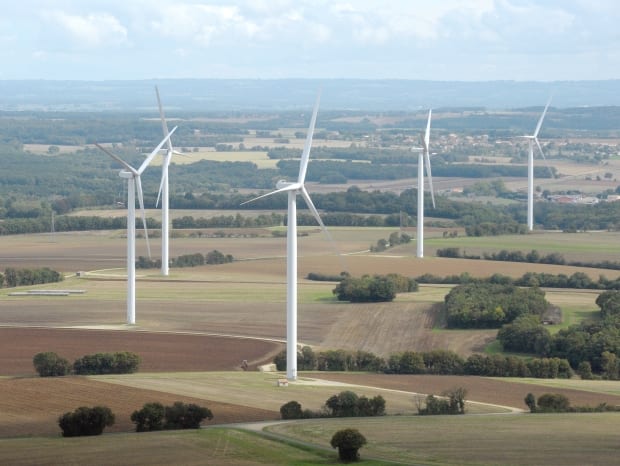Earlier this month, judges in Montpellier, France ordered French energy company GDF Suez to take down 10 wind turbines near the city of Arras in Northern France. The decision comes after a six-year legal struggle between GDF and a local couple who claimed the 10 turbines, installed back in 2007, destroyed the character of their 17th century chateau. According to the French court, the clean energy generators were guilty of causing the “total disfigurement of a bucolic and rustic landscape.” GDF Suez was given four months to dismantle the turbines or face a fine of €500 per day per turbine. GDF was also ordered to pay the chateau owners €37,500 in damages. The wind turbines had been providing electricity to over half of the 40,000 residents of Arras. The judges emphasized that the ruling was not because of actual demonstrated lost property value, but because of things like the “unsightliness of white and red flashing lights.”
In a statement, the couple’s lawyer, Philippe Bodereau, said: “This decision is very important because it demonstrates to all those who put up with windfarms with a feeling of powerlessness that the battle is not in vain, even against big groups, or authorities who deliver building permits, that legal options are available to everyone, that we have a right to live in peace and that people can do other things than suffer.”
Renewable energy advocates are worried that the ruling sets a dangerous precedent in France, and will make the country’s goal of deriving 25 percent of its energy from renewables by 2030 further out of reach. France is currently heavily dependent on nuclear. 58 nuclear reactors across France provide over 75 percent of the nation’s power mix. Nuclear reactors have long been the key to French energy independence. French President Francois Hollande has pledged to bring the country’s reliance on nuclear down to 50 percent by 2025, without lifting the country’s ban on fracking, in place since 2011.
While these nuclear reactors don’t seem to deter the 77 million annual foreign visitors, who bring in an estimated €37 billion to the economy, many in France are worried that the dramatic expansion of wind turbines planned by the Hollande government — up to 12,000 turbines by 2020 from 4,000 today – will destroy tourism.
A recent study in the U.S., led by researchers at Lawrence Berkeley National Laboratory, found no statistical evidence that the presence of wind turbines affected nearby house prices. These results were based on home sale data for 51,000 houses in 27 counties and nine states.
The ruling on the Arras turbines, which GDF has already appealed, is just the latest in the French people’s turbulent relationship with turbines. In August, a French court banned a local council from erecting turbines near the Mont Saint Michel abbey island after UNESCO warned they could cost the extremely popular site, visited by 2.5 million every year, its World Heritage status. Plans to build an offshore wind farm within view of Normandy D-Day beaches have also been blasted, some going so far as to call the renewable energy scheme “an insult to the memory of the thousands who died there.” Last year, villagers in southwestern France even took their mayor hostage for 24 hours after a plan to build 10 new wind turbines in the area was announced. German plans to set up 198-metre-high turbines along German/French border, have also caused an uproar, with opponents claiming that the wind farm would destroy the charm of the 15th century Chateau de Malbrouck
“Fifty percent of the cases (where turbines have been set up) are now before the courts,” Alexandre Gady, president of the Society for the Protection of the Landscape and Aesthetics in France told the AFP.
Studies in Europe trying to estimate the effect of turbines on tourism have come up with various numbers, suggesting that the impact is relatively low, but not negligible. One study found that “32 percent of tourists and locals do not mind wind turbines at all, while only 9.2 percent do,” and another that “59 percent of those surveyed… said they did not mind the turbines, while 28 percent said they were ‘acceptable’; in contrast, only 12 percent said they did not like the turbines.”
Some states in the U.S. — including California, New Jersey, Maine and Michigan — are even using their wind turbines to attract tourists, charging curious visitors a fee for a tour of a clean energy park.








